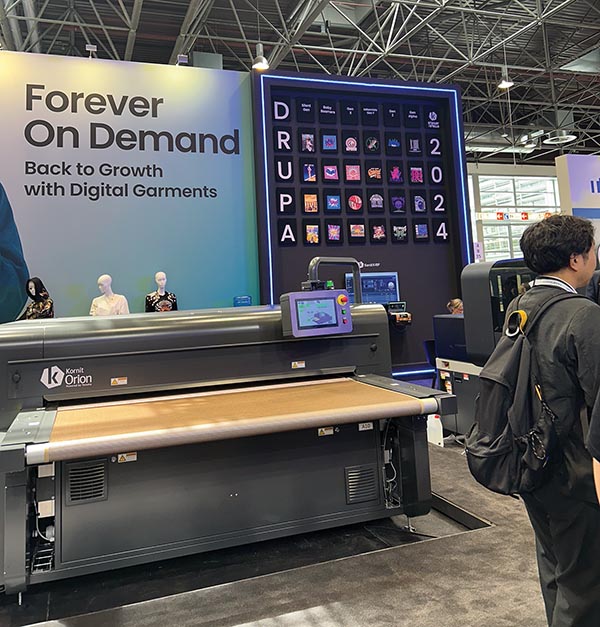
(This article originally ran in the June 1 edition of the drupa daily.)
Kornit Digital (Hall 4/B35) believes that textile printing is now at the same stage where print on paper was 25 years ago: predominantly analog, but on the brink of a digital transformation. The company has been working for most of those years to develop direct-to-garment and direct-to-fabric systems that can satisfy what it says is a rising on-demand market for digitally printed wearables and furnishings in custom-printed short runs.
Kornit Digital aspires to replace screen printing as the method of choice for applications like these, and at drupa, it will showcase a range of digital solutions for textile printing with quality meeting or exceeding that of the conventional process. The centerpiece will be Apollo, a high-speed, a highly automated inkjet press that Kornit calls a breakthrough for the kind of short-run production that can be impractical on analog screen equipment.
The company says that the high quality of Apollo’s printing comes from the thin layer of pigmented ink the device applies to cotton, polyester, cotton-polyester blends, Lycra, rayon, silk, leather, denim, linen, and wool. Claimed production output is 400 shirts per hour in an automated workflow that a single operator can oversee. The production sequence includes garment scanning, semi-automatic loading, automatic unloading, and smart curing.
At drupa, Kornit Digital said it plans to ship 16 Apollo presses this year and double that number in 2025. Customers can acquire the device under an all-inclusive click charge model that requires no up-front capital investment. In return, the customer commits to print a minimum number of clicks with payment due to the manufacturer after the printed product is sold.
Visitors can see the Apollo in action at Kornit Digital’s European headquarters in Düsseldorf, to which tours will depart from the company’s stand daily at 4 p.m. At the stand, visitors can inspect the Atlas Max Poly, a direct-to-garment polyester decoration system that can deliver up to 90 impressions per hour with a single operator. A key application for Atlas Max Poly is customizing and personalizing uniforms and other team/fan apparel.
Kornit Digital will Transformation des Textildrucks vorantreiben
Kornit Digital (Halle 4/B35) ist der Ansicht, dass sich der Textildruck heute in der gleichen Phase befindet, in der sich der Druck auf Papier vor 25 Jahren befand: überwiegend analog, aber an der Schwelle zu einer digitalen Transformation. Das Unternehmen hat die meiste Zeit dieser Jahre an der Entwicklung von Direct-to-Wear- und Direct-to-Fabric-Systemen gearbeitet, mit denen der nach eigenen Angaben wachsende On-Demand-Markt für digital bedruckte Kleidungsstücke und Einrichtungsgegenstände in individuell bedruckten Kleinauflagen bedient werden kann.
Kornit Digital strebt an, den Siebdruck als Methode der Wahl für solche Anwendungen abzulösen, und wird auf der drupa eine Reihe digitaler Lösungen für den Textildruck vorstellen, deren Qualität die des konventionellen Verfahrens erreicht oder übertrifft. Im Mittelpunkt steht Apollo, eine hochautomatisierte Hochgeschwindigkeits-Tintenstrahldruckmaschine, die Kornit als Durchbruch für die Art von Kleinauflagen bezeichnet, die mit analogen Siebdruckmaschinen nicht realisierbar sind.
Das Unternehmen sagt, dass die hohe Qualität des Apollo-Drucks von der dünnen Schicht pigmentierter Tinte herrührt, die das Gerät auf Baumwolle, Polyester, Baumwoll-Polyester-Mischungen, Lycra, Rayon, Seide, Leder, Denim, Leinen und Wolle aufträgt. Die angegebene Produktionsleistung beträgt 400 Hemden pro Stunde in einem automatisierten Arbeitsablauf, der von einem einzigen Bediener überwacht werden kann. Der Produktionsablauf umfasst das Scannen von Kleidungsstücken, halbautomatisches Beladen, automatisches Entladen und intelligentes Aushärten.
Auf der drupa erklärte Kornit Digital, dass es plant, in diesem Jahr 16 Apollo-Druckmaschinen auszuliefern und diese Zahl bis 2025 zu verdoppeln. Kunden können das Gerät im Rahmen eines All-inclusive-Click-Charge-Modells erwerben, das keine Vorab-Investitionen erfordert. Im Gegenzug verpflichtet sich der Kunde, eine Mindestanzahl von Klicks zu drucken, wobei die Zahlung an den Hersteller nach dem Verkauf des Druckprodukts erfolgt.
Besucher können den Apollo in der Europazentrale von Kornit Digital in Düsseldorf in Aktion sehen, zu der täglich um 16 Uhr Führungen vom Stand des Unternehmens aus starten. Auf dem Stand können Besucher den Atlas Max Poly besichtigen, ein Polyester-Direktdekorationssystem, das mit einem einzigen Bediener bis zu 90 Drucke pro Stunde liefern kann. Eine Hauptanwendung für Atlas Max Poly ist die individuelle Gestaltung und Personalisierung von Uniformen und anderer Mannschafts-/Fankleidung.














